|
|
|
Sort Order |
|
|
|
Items / Page
|
|
|
|
|
|
|
| Srl | Item |
| 1 |
ID:
121111
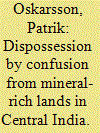

|
|
|
|
|
| Publication |
2013.
|
| Summary/Abstract |
Bauxite mineral projects in central India have in recent years generated conflicts over both the physical environment and equitable development for very vulnerable people. In one such project, a joint venture between the state government of Andhra Pradesh and a private investor, attempts are currently being made to open up land constitutionally reserved for India's Scheduled Tribes. The final outcome, though still uncertain, depends not only on the relative material resources of the opposing parties, but on a drawn-out process of contestation where the discursive resistance to tribal land dispossession has strong historical roots and many active supporters. Thus, for the project's promoters, their advantage rests on their ability to create confusion via superior access to, and control over, information, rather than relying on their direct authority.
|
|
|
|
|
|
|
|
|
|
|
|
|
|
|
|
| 2 |
ID:
157088
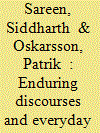

|
|
|
| 3 |
ID:
172223
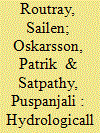

|
|
|
|
|
| Summary/Abstract |
This article analyses how long-running, multilayered conflicts over water at the Hirakud dam underpin present-day societal divisions in Odisha state. There are four unresolved conflicts over this dam in the state: movements against displacement, movements for rehabilitation, struggles between agricultural and industrial water users, and, finally, disputes between federal states. These have generated societal ruptures from the announcement of the dam in 1946 to the present day. We argue that understanding the confluence and ingrained, overlapping character of these conflicts provide important vantage points for understanding the present uneasy constitution of subregional state fabrication in Odisha.
|
|
|
|
|
|
|
|
|
|
|
|
|
|
|
|
| 4 |
ID:
157097
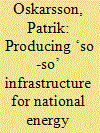

|
|
|
|
|
| Summary/Abstract |
This paper examines transport infrastructure of only middling quality at a Jharkhand coalfield as supporting rather than preventing national energy security. The modest technical efficiency of the infrastructure emerges from a need to align the national provision of energy with a complex political ecology of coal in which various actors seek benefits from its ‘safe’ transport, supply coal to cottage industries and provide alternative livelihoods for the displaced. Unlike in Mitchell's Carbon Democracy, Jharkhand's ‘so-so’ coal infrastructure ensures delivery of coal by being dispersed and flexible, thereby allowing supply by avoiding blockades from influential groups close to the mines.
|
|
|
|
|
|
|
|
|
|
|
|
|
|
|
|
| 5 |
ID:
158933
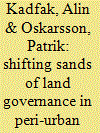

|
|
|
|
|
| Summary/Abstract |
This article examines how unstable land on a sandy peninsula in peri-urban Mangaluru becomes part of urban land contestation to primarily support continued informal tenure. The peninsula is undergoing shifts changing both its shape and land use under the influence of a range of biophysical and human forces. For the time being, fisherfolk can remain in place despite lacking land documents, but much of the peninsula has been proposed for commercial development projects. The sand-spit thus becomes a frontier for variegated land claims part of urbanization processes where the variable ‘nature’ of land is enmeshed. Drawing on urban political ecology and Indian land governance literature, the article highlights how the fluctuating land supports continued informality since the shifting sands make boundaries challenging to delimit and maintain, and, once stabilised, can be claimed by the state. The informalising characteristics of land, understood as an ‘informality machine’, reinforces similar ongoing urban transformations along the entire coastline, to mainly favour elite interests, but can also be seized upon by the fisherfolk themselves for new claims, or workarounds aimed at securing long-term tenure. Future research on the urban land question would do well to include a perspective of land as co-constituted by socio-natural processes.
|
|
|
|
|
|
|
|
|
|
|
|
|
|
|
|
|
|
|
|
|